
Outlook MAY 21, 2012 - Cover Stories - 1
22.08.2013
Статья в журнале Outlook, 21 мая 2012 г.
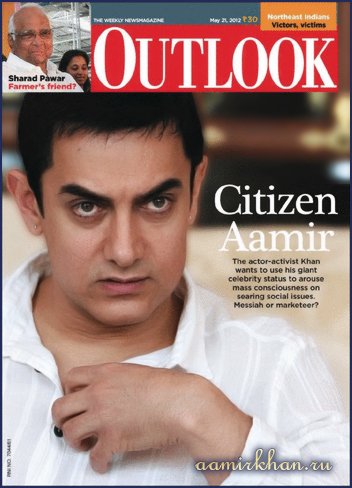
The Truth Paste
Aamir’s TV activism is a blockbuster.
But does it help to sprinkle stardust on real issues? The jury is out.
In the sprawling Prince’s Suite of the palatial Rambagh Palace hotel in Jaipur, Aamir Khan, spectacles perched enticingly on nose, fingers poised on the iPad in his hands, looks a visibly happy man. The official TRPS for Satyamev Jayate are yet to come in, but the Twittermeter started ticking soon after the actor’s social issues-based blockbuster show debuted last week, eliciting a stupendous "58 million impressions" for tweets on the show’s first episode on female foeticide. The potential viewership on Doordarshan, the Star bouquet and regional channels is estimated to be 400 million.
Not just that, the full episode was viewed by 1.5 lakh people in less than a day on YouTube. The show’s first telecast in the UK was so huge that it occupied the second spot in the popularity charts after Sky Sports, a first for an Indian show. A Pakistan channel is eager to grab its rights. Aamir’s fee of Rs 3.5 crore per episode is by far the highest charged by a celebrity anchor, that too for a non-prime time, cause-driven show. It’s fetching a record Rs 10 lakh for a 10-second ad spot, about three times the rate for the current IPL season. Main sponsors are doling out anywhere from Rs 6-18 crore to ride the Satyamev bandwagon.
"He connects to people at the popular level, is not diagnostic, raises conscience and pleads for change." Akhila Sivadas, Centre For Advocacy & Research
But beyond the numbers, the show has managed to strike a huge chord with the Indian audience in other ways. Vineet Kumar, media critic and author of Mandi Mein Media, calls it a "TV edition of the Anna andolan". Like the latter, Aamir’s TV activism has attracted a spontaneous, collective response and an instant connect with the cause. So far at the receiving end for his "quickfix and gimmicky" associations with causes and for "hijacking" serious issues like the Narmada movement, education reforms or dyslexia, Aamir, with this show, is earning praise from even the most hard-nosed and committed of activists. "He has lent us a voice which is being heard," says Kavita Srivastava, national secretary, People’s Union for Civil Liberties. "He is championing our work." Akhila Sivadas of the Centre for Advocacy and Research likes his persona as anchor. "He connects to people at the popular level, is not diagnostic, raises conscience and pleads for change," she says. Sociologist Shiv Visvanathan calls Aamir’s show the "new rediscovery of India" — one that is not so shining.
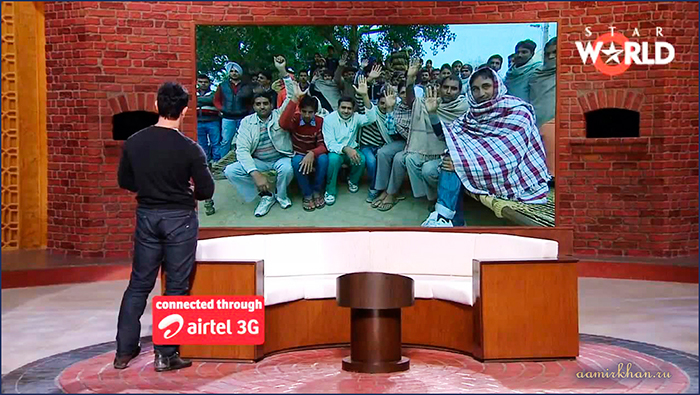
Taking stage Aamir on the sets of Satyamev Jayate
So, Aamir decided to start his mission by raising one of India’s worst secrets—female foeticide—and shattered a few myths in the process. That the practice is restricted not just to rural illiterates but is also prevalent among the educated middle and upper classes. The nexus of families, doctors and lawyers too stood exposed. "The show looked at both the micro and macro levels, dealt with the demographic, genetic and social aspects," says Visvanathan. Adds Trupti Shah of Baroda-based organisation Sahiyar, "He put the issue in a historical perspective, how the population control policy of the ’70s led to the problem."
High praise has flowed in also from those who have been working in the field. "Aamir was more updated on the issue than I," says Shripal Shaktawat, the Jaipur-based journalist featured in the show, who led the sting operation to trap 140 doctors engaged in illegal sex determination in Rajasthan, Gujarat and Madhya Pradesh. And Dr Sabu George, the independent activist whose petition led to the passing of the PCPNDT (Pre-Conception and Pre-Natal Diagnostic Techniques) Act, adds:"Aamir is a brilliant tactician who did in one hour what others have not been able to do in decades."
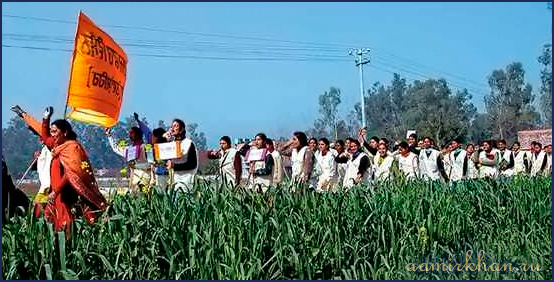
Just cause Rally against female foeticide in Nawanshahr, Punjab. (Photograph by T. Narayan)
So, has India’s smartest marketer, with this show, successfully reinvented himself as its latest soul-changing messiah? Perhaps. "Social issues is the new Olay cream and he is doing a rather sharp job of selling it," says Visvanathan. "Overnight Aamir has become India’s best-known sociologist," he adds, a tad mischievously.
"It’s not a revolution. The issue wouldn’t end with it, we will have to continue working on it." Kavita Srivastava, National Secy, PUCL
In fact, so overwhelming has been the support of the majority for Satyamev... that to question it in any way is to run the risk of being scorned and derided. "The moment you have problems with it, you are labelled anti-reform, anti-women. You are immediately put in the grey suspicion zone," says Vineet.
But that is not to say that Satyamev is without problems. For one, the nuances of presentation leave much to be desired. The show is deliberately manipulative, almost unfolding like a family tear-jerker, is not particularly layered and is overtly self-righteous. It’s not as though TV has not covered these issues. Print media too has written about them consistently. Even entertainment channels have had issues-driven shows like Na Aana Is Des Lado, Phulwa and Crime Patrol. But no one has talked about them with this kind of aplomb. Citizen Aamir grabs eyeballs. But while Aamir in the role of citizen journalist is all very fine, it cannot be used to denigrate or downplay the role of serious journalism, Rajdeep Sardesai, editor-in-chief, IBN-18 Network, feels. "The 13 episodes of the show can’t be compared to journalists plying the trade 365 days, 24x7," he says. "Both are valuable in their own way and should all be on the same side."
Nor can the overwhelming popularity of the show’s first episode negate some of its intensely Bollywood moments. Like the all-too-neat and dramatic argument that a skewed sex ratio will lead to marriage markets with buyers, sellers and brokers where women will be bought and sold like commodities. "Do equal numbers create gender equality and prevent violence against women?" asks Shohini Ghosh, professor at the AJK Mass Communication Research Centre at the Jamia Millia Islamia in Delhi. "If yes, then how do we explain atrocities against women when the sex ratio was better, as recorded, by say the 1961 census?"
"The 13 episodes of the show can’t be compared to journalists plying the trade 365 days, 24x7. Both are valuable." Rajdeep Sardesai, Editor-In-Chief, IBN-18 Network
Satyamev... has come under the feminist scanner for glossing over other complexities as well. It does not, for instance, pause to ponder over how the offence of sex-selective abortions could get dangerously mixed with the women’s right to abort. Shohini Ghosh is also upset with Aamir’s overt stress on 'Ma' and its significance in Indian culture. "Are women incomplete without playing the role of the mother?" she asks. "It is the privilege of the woman to choose to give birth or not. Why should their stature be diminished outside the paradigm of motherhood?" Like Vineet, she too draws a parallel of the show with the Anna campaign, which refused to see corruption as endemic but as something that could easily be solved through exemplary punishment. Satyamev... too offers an instant solution; it touts the collective strength of society as the jaadu ki chhadi (magic wand) which could make all evil disappear. Or a letter to the Rajasthan chief minister demanding strict action against offending doctors. "It smacks of a Rang De Basanti attitude, where a complex issue gets resolved by simplistic prescription or token action," says adman and commentator Santosh Desai (see column).
Just two episodes old, Satyamev... certainly seems to have jolted the middle-class Sunday morning. But will deep-rooted involvement result or will it be mere catharsis, a once-in-a-week easy, cosy washing away of guilt? Will it engender no more than a fake sense of having done something without moving one’s finger from the remote? "I’m interested to see whether the impact will be limited to our drawing rooms as family time, or whether it’ll be more than that," says media professional Aditya Raj Kaul, who has aggressively campaigned for causes like the Jessica Lal and Priyadarshini Mattoo murders. "There should definitely be a mechanism to check whether it is actually having a long-lasting impact, because very often what we see on television is different from what is happening on the ground."
"Social issues is the new Olay cream of today and Aamir Khan is doing a rather sharp job of selling it."Shiv Visvanathan, Sociologist
"The flaw of the show," as Visvanathan sees it, "is that it can never become a movement as some people are making it out to be." PUCL’s Srivastava agrees, "It’s not a revolution. The issue wouldn’t end with it, the show won’t solve the problem. We’ll have to continue working." But Sivadas says, "It’s a communication vehicle, not a dry-cleaning mechanism to clean up society; it’ll help create an enabling environment."
But will it continue to engage the masses, retain the core audience, or will they drop off and go back to their good old sleepy Sundays? "As a nation, we’re not anxious to face reality, and waking up on a Sunday morning to harsh realities may not actually work," says a media buyer.
The next 12 weeks will be worth a watch, to find out if issues like female infanticide, hunger deaths, rural education will hold audiences to as rapt attention as the machinations of the Kauravas and Pandavas in Mahabharata did two decades ago on Sunday mornings, the same time.
Aamir The Activist
Other causes that have been dear to the actor
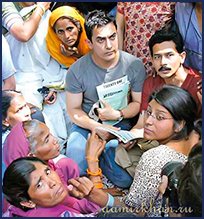
Apr 2006 Save the Narmada Aamir plunges into Narmada Bachao Andolan stir after the Gujarat government decision to raise height of Sardar Sarovar Dam on the river. Stands shoulder-to-shoulder with Medha Patkar and Arundhati Roy, demanding that people displaced by the dam be rehabilitated. His stand blocks entry of Fanaa into Gujarat.
Sep 2006 Coca Cola is safe After the pesticides row takes the fizz out of colas, Coca Cola brand ambassador Aamir takes TV viewers on a tour of a bottling plant, interacting with the factory staff, discussing the production process, and putting up a veritable chemistry class with the happy result: "Coca Cola is 100 per cent safe."
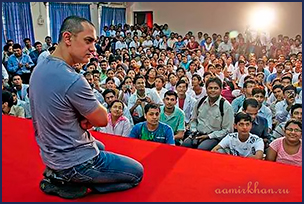
Dec 2007 Reading dyslexics With Taare Zameen Par, Aamir draws nation's attention to the much-ignored learning disability. As director-actor, he sensitively shows a dyslexic child, getting the affliction talked about in homes and classrooms. Follows it up by meeting dyslexic kids and anchoring a TV show on dyslexia; also attends a major international conference.
Jul 2008 Student woes The star stands up for the woes of Indian students. Shares stage with US Secretary of State Hillary Clinton discussing the obsession with marks, the pressures of performance; the absence of the culture of asking questions, of understanding rather than learning by rote.
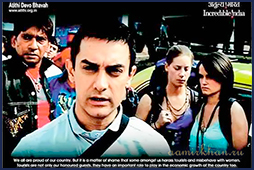
Feb 2009 Atithi Devo Bhava Gives Incredible India campaign a public face. TV spots on the Atithi Devo Bhava theme show him highlight two deterrents to India’s tourism potential: harassment of foreign tourists and vandalism of monuments.
2009 Go green His face lit up by a candle he’s holding, India’s Earth Hour ambassador appeals to us to do our bit for the environment: turn off lights for an hour to raise awareness on climate change.
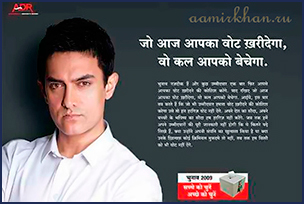
2009, 2012 Vote clean Aamir launches a pre-poll Voter Awareness Campaign with "Sachche ko chunein, achchhe ko chunein" theme stamped on ad films, print ads, online and mobile messages. Aamir charges no fees, bears the cost of producing the ad films. In 2012 too, automated calls take Aamir's appeal to choose 'clean' candidates to lakhs of voters.
Apr 2010 Toilet training Nikumbh Sir did the rounds of schools again, this time with a different concern—sanitation. Appointed sanitation brand ambassador to promote cleanliness in CBSE schools, Aamir takes his clean-up message to his young fans, promising to know more about sanitation from officials and create a "package that will be easily available through CDs and Internet for use in schools".
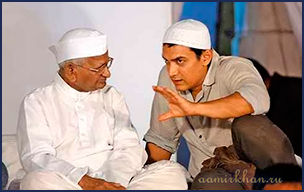
Aug 2011 Anna, the hero On the 12th and final day of Anna Hazare's fast, pops up at Ramlila Maidan. Sings Mitwaa from Lagaan, coaxing Anna to break his fast and letting it be known that he knew all about, and was all for, the Jan Lokpal Bill. Also takes pain to say "I am not the biggest hero, Anna is the real hero." Also expresses support for Manipur's AFSPA activist Irom Sharmila.
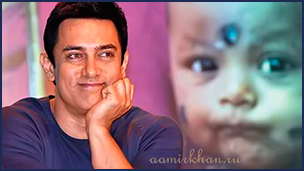
Nov 2011 Kuposhan, Quit India Thanks to his personal interest in children's issues, Aamir is named Unicef's national ambassador. Advocating rights and nutrition of children, Aamir in the attention-grabbing "Kuposhan Bharat Choro" ad tells children that though India won independence in 1947, it has yet to wrest freedom from malnutrition. He and adman-lyricist Prasoon Joshi will make 50 short films on malnutrition.
By Namrata Joshi with Neha Bhatt in New Delhi and Arti Sharma in Mumbai
Комментарии